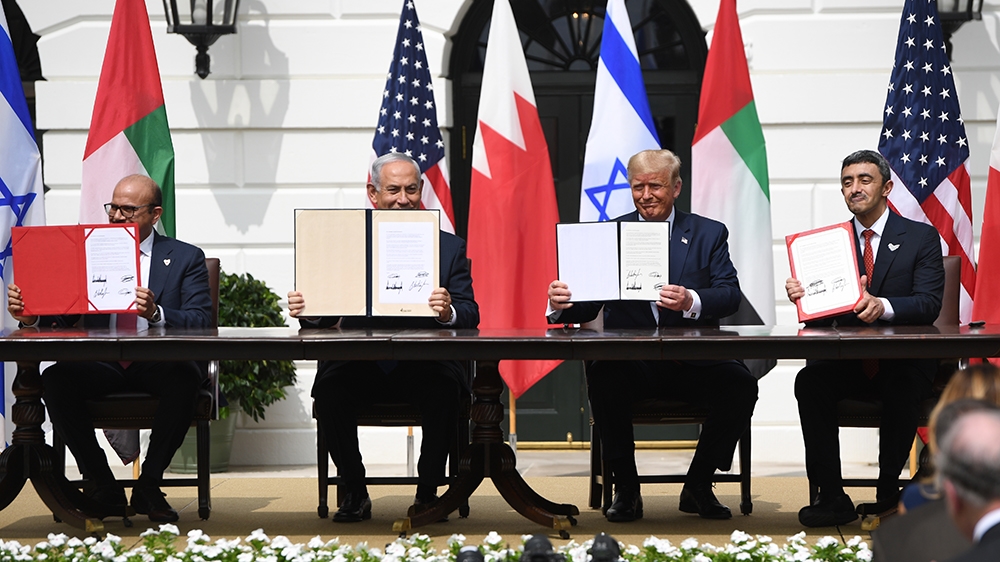
September 15 marks three years since the United Arab Emirates normalised ties with Israel under a United States-brokered agreement known as the Abraham Accords.
The UAE became only the third Arab nation, after Egypt (1979) and Jordan (1994), to establish diplomatic relations with Israel, ending a 25-year period without such ties.
Bahrain followed suit a month later and, in shortly afterwards, Sudan’s transitional government announced they would normalise relations – but the idea was rejected by several Sudanese political parties and was not finalised. Then in December, Morocco agreed to establish full diplomatic and trade relations with Israel and establish direct flights between the two countries.
The deals, brokered by the Trump administration, broke years of consensus among most Arab states which had maintained any official recognition of Israel should be contingent upon the cessation of the occupation of Palestinian territory and the establishment of a two-state solution based on the 1967 borders.
- Egypt: In 1979, Egypt’s President Anwar Sadat signed a peace treaty with Israel that had been negotiated during President Jimmy Carter’s Camp David summit the previous year. According to the agreement, Israel would relinquish the Sinai Peninsula to Egypt in exchange for Egypt’s full recognition of the Jewish state and the establishment of full diplomatic relations.
- Jordan: On October 26, 1994, King Hussein of Jordan and Israeli Prime Minister Yitzhak Rabin formally established peace during a ceremony witnessed by then-US President Bill Clinton. It came a year after the Oslo Peace Accords between Israel and the Palestinian Liberation Organization (PLO).
- UAE: On September 15, 2020, US President Donald Trump together with Israeli Prime Minister Benjamin Netanyahu signed agreements with Bahrain’s Foreign Minister Abdullatif al-Zayani and Emirati Foreign Minister Sheikh Abdullah bin Zayed Al Nahyan.
- Morocco: On December 10, 2020, with the help of the US, Israel and Morocco agreed to establish full diplomatic and trade relations.
- Sudan: Although Sudan was part of the Abraham Accords, it has yet to finalise the signing of a normalisation treaty with Israel.
What are diplomatic relations between states?
Diplomatic relations between two nations involve the mutual recognition of each other’s sovereignty and government. This typically involves the exchange of ambassadors, bilateral agreements, economic ties and mutual cooperation.
Diplomatic relations and the conventions surrounding them are defined by international law and customs, which have evolved over time.
They have been codified in the 1961 United Nations Vienna Convention.
Trade between signatories of the Abraham Accords
Trade between Israel and the UAE surpassed $2.5bn in 2022 and reached $1.85bn in the first seven months of 2023 according to Reuters news agency.
In March 2023, a free trade agreement signed by Israel and the UAE came into effect, removing tariffs on about 96 percent of goods traded between the two. The deal aims to boost bilateral trade to more than $10bn over the next five years.
Trade with Bahrain was $8.5m in the same seven-month period. Israel opened its embassy in Bahrain on September 4 and an agreement between Israel and Bahrain’s central bank on fintech was signed a few days later.
Israeli-Moroccan bilateral trade has also increased over the past three years, with Israel announcing last year that it wanted to target an annual trade volume of $500m with Morocco.
The Israeli government has also considered recognising Morocco’s sovereignty over the disputed Western Sahara, which Morocco claims.
How do Arab citizens view normalising ties with Israel?
According to the results of a survey conducted by Arab Barometer, a research group based at Princeton University, most citizens across the MENA region reject the normalisation of relations between Arab states and Israel.
In a survey conducted between October 2021 and July 2022 with 26,000 participants living in 11 populous MENA countries, participants were asked the question: “To what extent do you favour or oppose the normalisation of relations between Arab states and Israel?”
In nine of the 11 countries surveyed, fewer than one in five said they supported normalisation agreements with Israel.
Algerians were most opposed to Israeli relations with only 4 percent in favour, followed by Egypt (5 percent), Jordan (5 percent), Palestine (6 percent), Libya (7 percent), Mauritania (8 percent), Tunisia (11 percent), Iraq (14 percent) and Lebanon (17 percent).
Roughly one in three Moroccans (31 percent) and 39 percent of Sudanese were in favour of normalisation with Israel.







